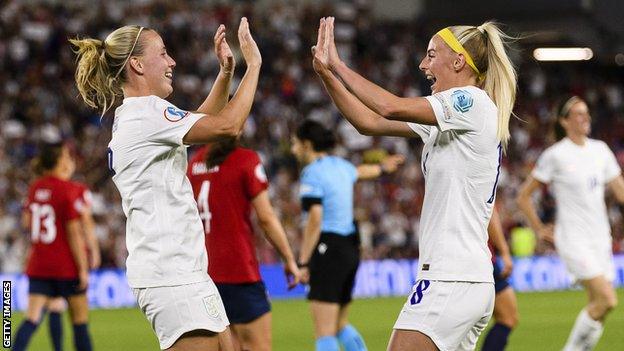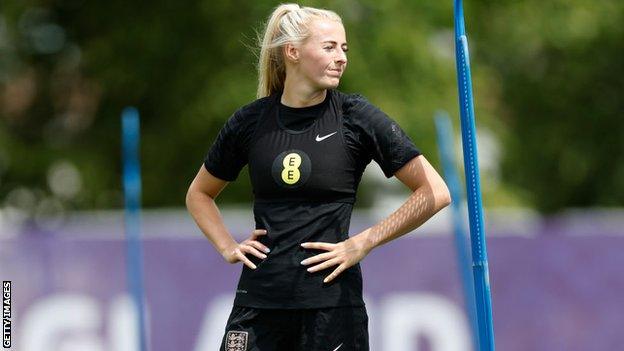England's Chloe Kelly: 'Why does everyone fear ACL injuries?'
- Published

Chloe Kelly (right) came on as a substitute in England's 8-0 win over Norway
England winger Chloe Kelly wants to change what she feels are negative attitudes towards anterior cruciate knee ligament injuries in women's football.
Spain's Ballon d'Or winner Alexia Putellas and Northern Ireland striker Simone Magill have both been forced out of Euro 2022 after damaging their cruciate ligament.
Manchester City's Kelly was forced to miss the Olympics after sustaining an ACL injury in May 2021 that kept her out of action for 11 months, and said she couldn't face watching her Great Britain team-mates as they reached the quarter-finals in Tokyo.
She has already offered emotional support to Magill, her former Everton team-mate, after the forward was injured during Northern Ireland's 4-1 defeat by Norway in Southampton last Thursday.
The injuries to Putellas and Magill have once again sparked a debate about ACL injuries - two years ago, the Football Association launched a study into why female footballers are eight times more likely to suffer them than male counterparts.
That came after England midfielder Jordan Nobbs, ruled out of the 2019 World Cup with ACL damage, suggested there was a link between such injuries and menstrual cycles, and called for more research.
But Kelly, who has said that she struggled mentally, external during her absence, also feels that changing the "negativity" around serious knee ligament injuries can help players.
"Why does everyone fear it so much? Why is it when someone has done their ACL, there's just negativity that goes with it? We put nine to 12 months on it as soon as it comes," said Kelly.
"I think the negativity around ACL's, more than the research, is something that I would like changing. You're putting everything into it just like another injury.
"Going through rehabilitation when there is so much noise around how bad it is, probably makes it worse. Any injury is difficult."
'I couldn't face watching the Olympics'
Having missed out on the Olympics because of injury, Kelly is now part of an England Euro 2022 squad hoping to go all the way.
The 24-year-old has made two substitute appearances so far, playing a part in wins over Austria and Norway that have secured England a quarter-final place as Group A winners.
Kelly, competing in her first major tournament, is hoping to earn a first start in England's final group game against Northern Ireland on Friday.
"I'm just enjoying myself and living in the moment," Kelly said, as she reflected on her year in recovery.
She has made sure, though, to give support to Magill as she she begins her long road back.
"I've had a conversation with [Magill] and I'm always going to be there for her throughout her rehab because it is so difficult," said Kelly.
The Manchester City winger, who herself had support from Nobbs as she fought to regain fitness, said that she initially found it tough to come to terms with the injury she sustained during a Women's Super League game against Birmingham 14 months ago.
One of the most difficult moments for Kelly was dealing with the realisation that she wouldn't be going to Tokyo with Team GB.
"I couldn't actually face watching [the Olympics]. It was a very difficult summer last year. Looking back, it seems like so long ago," said Kelly.
"I'm just enjoying myself here now. I forget sometimes that I was injured."
'What's the worst that can happen?'

Chloe Kelly returned for Manchester City at the end of the season and proved her fitness to earn selection for the Euro 2022 squad
Kelly said she always "had my goal on the Euros" but the most difficult periods came at the "very start and the very end" of her recovery.
"The start was the toughest because you know what is ahead and the pain. You lose everything - just being able to walk, to go to the toilet by yourself, things like that. It's not nice.
"Then the end is where you feel ready, but then you are not quite ready. You are training with the team but can't play. Throughout the rest of it you see improvements every day."
Despite the tough moments, Kelly said the experience has changed her outlook on football and helped her appreciate this summer even more.
"When something like that happens and you're away from the game for so long. I think nothing really fazes you after," she added.
"I used to get quite nervous before games. Now I don't really have those nerves because I'm thinking: 'what's the worst that can happen?'
"I've been through the worst. I have to enjoy every moment, playing with no fear."

What's happened to this iconic Scottish music festival? The Rise and Fall of T in the Park
Can partners in grime save their rubbish company? Watch Filthy Business on BBC iPlayer now
